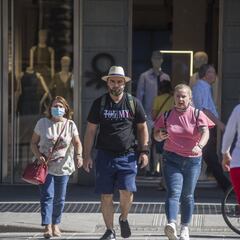What is the Delta Plus variant? How is it different than the initial strain?
A sub-strain of the Delta variant is now being referred to as the “Delta Plus” as it differs from the original first found in India in a few significant ways.


The name “delta plus” seems to imply that it is in some way more powerful or worse than the initial version. However, scientists have not yet confirmed if the “delta plus” variant is more contagious or deadly than the delta from which it developed.
What is the #COVID19 Delta Plus variant⁉️ pic.twitter.com/OgvcHiAfEP
— World Health Organization (WHO) (@WHO) June 26, 2021
While promising news, on 22 June, the Indian health ministry has warned that the “delta plus” variant has a mutation on the spike protein, which they believe indicates “increased transmissibility, stronger binding to receptors of lung cells,” and “potential reduction in monoclonal antibody response.”
While the way the “delta plus” is being reported may sound alarming, most scientists believe more information is needed to understand how it really differs from the initial variant. Director of the Clinical Virology Laboratory at Stanford, Benjamin Pinsky, told the Los Angles Times that there is “not much information available to suggest it’s worse than anything else that’s circulating.” Pinsky did mention that these facts could change and that more research was still needed.
Read More
- Fourth Stimulus Check: what are the reasons the new payment is at risk?
- Coronavirus US: why the covid-19 Delta variant is more dangerous
- Can I get the Delta variant if I already had covid-19?
The CDC had already suspected that the delta variant could be transmitted more easily and that monoclonal antibody treatments may not be as effective in preventing fatal outcomes in patients. The CDC has already listed the delta as a variant of concern, meaning scientists have reason to believe the strain meets one or more of the following categories:
- "Evidence of impact on diagnostics, treatments, or vaccines ;
- Evidence of increased transmissibility ; and
- Evidence of increased disease severity.
How do we stop more variants from emerging?
In a press conference with Dr. Anthony Fauci, he described delta as the “greatest threat in the U.S. to our attempt to eliminate COVID-19.” The public health expert followed up these comments with “good news,” saying that the vaccines available “are effective against the Delta variant.”
The so-called Delta Plus variant of COVID-19 is dangerous but appears unlikely to be a game-changer https://t.co/BYWSWzuq4L
— TIME (@TIME) June 27, 2021
Related stories
One way to stop the emergence of new and more infectious strains of the virus is to vaccinate a higher percentage of the population. With fewer people to infect, transmission decreases. With fewer opportunities to be transmitted, the virus has fewer opportunities for its genetic code to be alerted which is how these mutations emerge. However, most experts do not believe that the virus will suddenly become as contagious as other infections like measles.
The majority of those in the scientific community believe that to stop the emergence of new variants that are “more contagious,” a global and equitable vaccine distribution plan is needed. Until transmissions slow and the virus is not given so many chances to mutate, we may continue to see changes to the virus's genetic code that do make it spread more easily.

